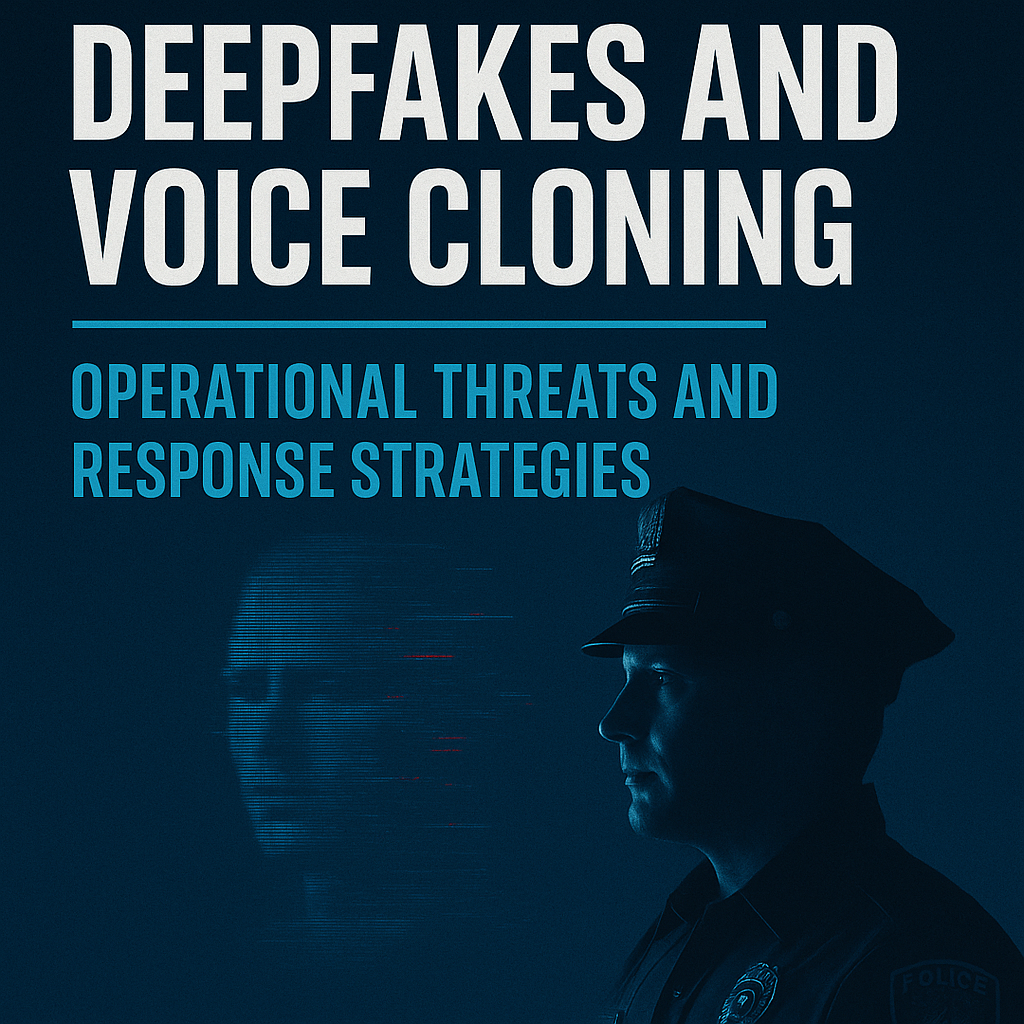
Deepfakes and Voice Cloning: Operational Threats and Response Strategies
Course Overview: Deepfake threats have skyrocketed in recent years, creating a new breed of scams and hoaxes that put public trust and officer safety on the line. This one-day course (taught by veteran law enforcement instructors) cuts through the hype with no-nonsense, field-smart insights on AI-driven deception. Participants will examine real cases – for example, how scammers cloned a police chief’s voice in 2024 to defraud victims – and learn practical strategies to detect and counter deepfakes. From bogus “evidence” videos to fake 911 calls, we focus on what front-line officers and investigators can do tomorrow to stay ahead of AI-fueled impersonation. This isn’t theory from five years ago – it’s actionable tactics to protect your community from deepfake scams right now.
Key Topics Covered:
Deepfakes in criminal schemes: How malicious actors manipulate photos/videos into realistic fakes for harassment or sextortion (including cases where minors’ images were turned into explicit content).
Voice cloning & impersonation scams: The threat of AI-generated voices mimicking family members or officials – e.g. cloned voices used in “kidnapping” ransom calls or to impersonate police leadership.
Synthetic identities and IDs: Use of AI-generated profile pictures and fake IDs to facilitate identity fraud and impersonation (criminals creating realistic fake driver’s licenses, police credentials, etc.).
Deepfake videos & misinformation: Risks of AI-fabricated videos (fake incidents, officials, or news) being used to spread false information and incite unrest – and how to respond when “evidence” might be bogus.
Spotting the fakes: Practical techniques to identify deepfake audio/video in the field – from detecting unnatural speech patterns and odd visual details to quick verification steps that separate fact from fake.
Date/Location: Select Date/Location
Registration:
Course Format: 1 Day (8 Hours) – Live In-Person Training
Target Audience: Patrol officers, detectives, investigators (fraud, cybercrime, etc.), and any law enforcement personnel who may encounter AI-based deception or digital evidence.
Learning Outcomes: By the end of this training, participants will be able to:
Recognize common indicators of deepfake content in videos, images, or voice recordings during investigations.
Distinguish genuine evidence from AI-manipulated media, preventing investigative missteps caused by fake audio or video.
Deploy quick verification and media analysis tactics to confirm authenticity of suspect digital content (e.g. identifying tell-tale visual artifacts or audio anomalies).
Respond effectively to incidents involving AI impersonation (such as scam calls or hoax videos), including proper evidence preservation and interagency notification.
Educate and brief colleagues or community leaders on emerging deepfake threats, bolstering overall agency preparedness for AI-driven scams.
Course Overview: Deepfake threats have skyrocketed in recent years, creating a new breed of scams and hoaxes that put public trust and officer safety on the line. This one-day course (taught by veteran law enforcement instructors) cuts through the hype with no-nonsense, field-smart insights on AI-driven deception. Participants will examine real cases – for example, how scammers cloned a police chief’s voice in 2024 to defraud victims – and learn practical strategies to detect and counter deepfakes. From bogus “evidence” videos to fake 911 calls, we focus on what front-line officers and investigators can do tomorrow to stay ahead of AI-fueled impersonation. This isn’t theory from five years ago – it’s actionable tactics to protect your community from deepfake scams right now.
Key Topics Covered:
Deepfakes in criminal schemes: How malicious actors manipulate photos/videos into realistic fakes for harassment or sextortion (including cases where minors’ images were turned into explicit content).
Voice cloning & impersonation scams: The threat of AI-generated voices mimicking family members or officials – e.g. cloned voices used in “kidnapping” ransom calls or to impersonate police leadership.
Synthetic identities and IDs: Use of AI-generated profile pictures and fake IDs to facilitate identity fraud and impersonation (criminals creating realistic fake driver’s licenses, police credentials, etc.).
Deepfake videos & misinformation: Risks of AI-fabricated videos (fake incidents, officials, or news) being used to spread false information and incite unrest – and how to respond when “evidence” might be bogus.
Spotting the fakes: Practical techniques to identify deepfake audio/video in the field – from detecting unnatural speech patterns and odd visual details to quick verification steps that separate fact from fake.
Date/Location: Select Date/Location
Registration:
Course Format: 1 Day (8 Hours) – Live In-Person Training
Target Audience: Patrol officers, detectives, investigators (fraud, cybercrime, etc.), and any law enforcement personnel who may encounter AI-based deception or digital evidence.
Learning Outcomes: By the end of this training, participants will be able to:
Recognize common indicators of deepfake content in videos, images, or voice recordings during investigations.
Distinguish genuine evidence from AI-manipulated media, preventing investigative missteps caused by fake audio or video.
Deploy quick verification and media analysis tactics to confirm authenticity of suspect digital content (e.g. identifying tell-tale visual artifacts or audio anomalies).
Respond effectively to incidents involving AI impersonation (such as scam calls or hoax videos), including proper evidence preservation and interagency notification.
Educate and brief colleagues or community leaders on emerging deepfake threats, bolstering overall agency preparedness for AI-driven scams.